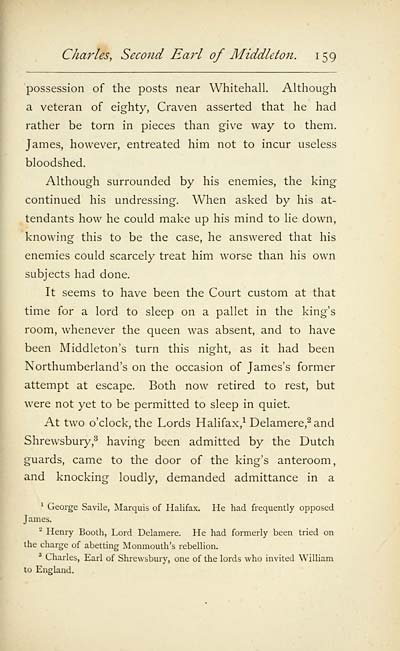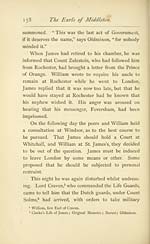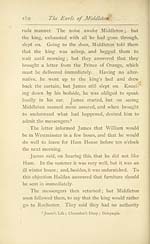Download files
Complete book:
Individual page:
Thumbnail gallery: Grid view | List view

Charles, Second Earl of Middleton. 159
possession of the posts near Whitehall. Although
a veteran of eighty, Craven asserted that he had
rather be torn in pieces than give way to them.
James, however, entreated him not to incur useless
bloodshed.
Although surrounded by his enemies, the king
continued his undressing. When asked by his at-
tendants how he could make up his mind to lie down,
knowing this to be the case, he answered that his
enemies could scarcely treat him worse than his own
subjects had done.
It seems to have been the Court custom at that
time for a lord to sleep on a pallet in the king's
room, whenever the queen was absent, and to have
been Middleton's turn this night, as it had been
Northumberland's on the occasion of James's former
attempt at escape. Both now retired to rest, but
were not yet to be permitted to sleep in quiet.
At two o'clock, the Lords Halifax, 1 Delamere, 2 and
Shrewsbury, 3 having been admitted by the Dutch
guards, came to the door of the king's anteroom,
and knocking loudly, demanded admittance in a
1 George Savile, Marquis of Halifax. He had frequently opposed
James.
2 Henry Booth, Lord Delamere. He had formerly been tried on
the charge of abetting Monmouth's rebellion.
3 Charles, Earl of Shrewsbury, one of the lords who invited William
to England.
possession of the posts near Whitehall. Although
a veteran of eighty, Craven asserted that he had
rather be torn in pieces than give way to them.
James, however, entreated him not to incur useless
bloodshed.
Although surrounded by his enemies, the king
continued his undressing. When asked by his at-
tendants how he could make up his mind to lie down,
knowing this to be the case, he answered that his
enemies could scarcely treat him worse than his own
subjects had done.
It seems to have been the Court custom at that
time for a lord to sleep on a pallet in the king's
room, whenever the queen was absent, and to have
been Middleton's turn this night, as it had been
Northumberland's on the occasion of James's former
attempt at escape. Both now retired to rest, but
were not yet to be permitted to sleep in quiet.
At two o'clock, the Lords Halifax, 1 Delamere, 2 and
Shrewsbury, 3 having been admitted by the Dutch
guards, came to the door of the king's anteroom,
and knocking loudly, demanded admittance in a
1 George Savile, Marquis of Halifax. He had frequently opposed
James.
2 Henry Booth, Lord Delamere. He had formerly been tried on
the charge of abetting Monmouth's rebellion.
3 Charles, Earl of Shrewsbury, one of the lords who invited William
to England.
Set display mode to:
![]() Universal Viewer |
Universal Viewer | ![]() Mirador |
Large image | Transcription
Mirador |
Large image | Transcription
Images and transcriptions on this page, including medium image downloads, may be used under the Creative Commons Attribution 4.0 International Licence unless otherwise stated. ![]()
| Histories of Scottish families > Earls of Middleton, Lords of Clermont and of Fettercairn > (175) |
|---|
| Permanent URL | https://digital.nls.uk/95313079 |
|---|
| Description | A selection of almost 400 printed items relating to the history of Scottish families, mostly dating from the 19th and early 20th centuries. Includes memoirs, genealogies and clan histories, with a few produced by emigrant families. The earliest family history goes back to AD 916. |
|---|

